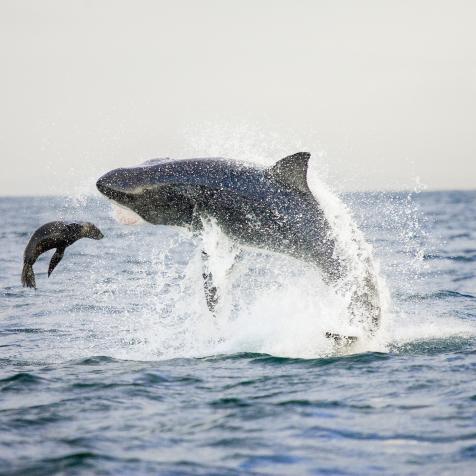
fjdelvalle
Curiosity Daily: Octopus Culture, Schizophrenia Origins, Killing Cancer
Learn about octopi forming communities, clues to the origins of schizophrenia, and a new compound giving researchers hope for fighting tough to treat cancers.
September 15, 2022
Octopus Culture
- “Hidden World of Octopus Cities and Culture Shows why it’s Wrong to Farm These Sentient Creatures” by Guardian Magazine
- “The question of animal emotions” by Frans B. M. De Waal and Kristin Andrews
- “Why octopuses are building small “cities” off the coast of Australia” by Annalee Newitz
- “A second site occupied by Octopus tetricus at high densities, with notes on their ecology and behavior” by David Scheel, et al.
- Animal Culture by Zhana Reznikova
Schizophrenia Origins
- “Landmark Study Reveals Clearest Genetic Signals Yet for Schizophrenia Risk” by Rutgers Research
- “Mapping genomic loci implicates genes and synaptic biology in schizophrenia” by Vassily Trubetskoy, et al.
- “What is Schizophrenia?” by The American Psychiatric Association
- “What is a Gene?” by Medline Plus
Killing Cancer
- “Promising Compound Kills Range Of Hard-To-Treat Cancers By Targeting A Previously Undiscovered Vulnerability” by UT Southwestern Medical Center
- “Targeting LIPA independent of its lipase activity is a therapeutic strategy in solid tumors via induction of endoplasmic reticulum stress” by Xihui Liu, Suryavathi Viswanadhapalli, Shourya Kumar, Tae-Kyung Lee, Andrew Moore, Shihong Ma, Liping Chen, Michael Hsieh, Mengxing Li, Gangadhara R. Sareddy, Karla Parra, Eliot B. Blatt, Tanner C. Reese, Yuting Zhao, Annabel Chang, Hui Yan, Zhenming Xu, Uday P. Pratap, Zexuan Liu, Carlos M. Roggero, Zhenqiu Tan, Susan T. Weintraub, Yan Peng, Rajeshwar R. Tekmal, Carlos L. Arteaga, Jennifer Lippincott-Schwartz, Ratna K. Vadlamudi, Jung-Mo Ahn & Ganesh V. Raj.
- “Scientists Discover New Molecule That Kills Hard-to-Treat Cancers” By Amanda Siegfried
Follow Curiosity Daily on your favorite podcast app to get smarter with Calli and Nate — for free! Still curious? Get exclusive science shows, nature documentaries, and more real-life entertainment on discovery+!
Go to https://discoveryplus.com/curiosity to start your 7-day free trial. discovery+ is currently only available for US subscribers.
Next Up
First Marine Biologist to Win Prestigious Conservation Award
A woman has become the first marine biologist to win a $250,000 environmental prize for her work on preserving seahorses.
Underwater Noise Pollution Strikes the Wrong Chord
Meet Morgan J. Martin, PhD, a marine scientist who studies underwater sounds with whales, dolphins, and porpoises. Morgan observes how these marine creatures – also known as cetaceans – many of which navigate their underwater habitats through echolocation.
Every Week Should Be World Oceans Week
Danni Washington is not only the face of Discovery Exploration, but she is also an ocean advocate and conservationist who has plans on how everyone can make a big impact.
An Otterly Adorable Awareness Week
Our southern sea otters at Georgia Aquarium are furry, energetic, and (of course) adorable. They spend most of their days swimming, playing, and eating, but most importantly they inspire our guests to care for our world’s waters.
Curiosity Daily Podcast: Romanesco Fractals, Dolphin Names & Evolution vs. Mating
Learn about evolutionary compromises; the fractals of Romanesco cauliflower; and dolphins that learn each other’s names.
Shark Week: The Podcast is Splashing into the Scene
Bring the magic of Shark Week to your ears with this brand-new podcast.Shark Week: The Podcast launches July 18th on Spotify, Apple Podcasts, and wherever you listen to podcasts.And get your heart pumping for Shark Week, starting July 24 on Discovery and discovery+.
Shark Week: The Podcast – How Sharks Are Built to Hunt
Dive in with marine biologist and shark expert Luke Tipple as he shares amazing facts about sharks' super-hero senses and dispels common shark myths.
Curiosity Daily Podcast: 16 Psyche, Xenotransplantation, Ocean Waves Become a Rave
Today, you’ll learn about a metallic object in space that might be worth seven hundred quintillion dollars, how genetically engineered pig hearts could save tons of human lives, and how bioluminescent waves are putting on trippy light shows in the world’s oceans.
Curiosity Daily Podcast: Pee and Seagrass, Heart Sound Maps, Modified Mosquitos
Today we talk about how crystallizing human urine can help save seagrass, a new AI program that can detect early signs of heart disease, and how mosquitos can be used to vaccinate against malaria.
Curiosity Daily Podcast: “Breaking the Seal” Myths, Dine Under the Sea in the Maldives, and Tardigrade Superpowers
Learn about how researchers could tap into a tardigrade superpower to protect medicines and vaccines; the Ithaa Undersea Restaurant in the Maldives where you can dine with the fishes; and whether “breaking the seal” is a real thing when you’re drinking.









.JPG.rend.hgtvcom.476.476.suffix/1591739192725.jpeg)






